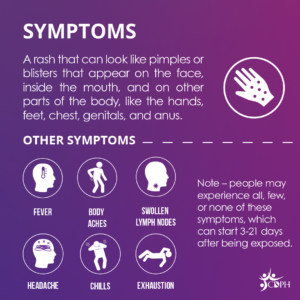Mpox
Ventura County Public Health continues to provide testing guidance and follow-up to ensure timely and thorough support for the community. The risk of mpox to the general population remains low.
To view up-to-date data on mpox in California by county (including Ventura County numbers) click here.
About Mpox
Mpox is a rare disease that is caused by infection with mpox virus. Mpox spreads through prolonged skin to skin contact. Taking steps to avoid prolonged skin to skin contact with an infected person can reduce your risk of getting mpox. Contact includes:
sex
kissing
sharing bedding and clothing
Groups that may be at high risk of mpox include:
health and care workers at risk of exposure;
people who have multiple sex partners, including men who have sex with men; and
sex workers of any gender and their clients.
Mpox can be serious, though most cases resolve on their own. You should see a doctor right away if you think you have been exposed.
Symptoms
Mpox symptoms usually start within 2 weeks of exposure to the virus. Initial symptoms are similar to flu (fever, headache, fatigue, swollen lymph nodes), followed by a rash and pus-filled sores. The rash or sores may be located on or near the genitals or rectum but could also be on other areas like the hands, feet, chest, or face.
2 weeks of exposure to the virus. Initial symptoms are similar to flu (fever, headache, fatigue, swollen lymph nodes), followed by a rash and pus-filled sores. The rash or sores may be located on or near the genitals or rectum but could also be on other areas like the hands, feet, chest, or face.
Testing and Treatment
If you develop a suspicious rash or were in contact with someone who has tested positive for mpox, speak to your doctor right away for guidance and testing. If you do not have a doctor, please visit: Ambulatory Care to find a clinic near you.
Talk to your health care provider about medications for your symptoms and skin care advice to promote healing. For additional preventative measures to take at home, visit CDC’s What to Do If You Are Sick webpage.
Vaccination
The JYNNEOS mpox vaccine is now covered under Medicare and Medicaid and is expected to be covered by private insurance for those eligible. Availability of vaccines may vary. For a vaccine location near you, ask your doctor/clinic or check your local pharmacy.
Prevention
Avoid intimate and physical contact with anyone who has symptoms
Talk openly with sexual partners prior to intimate physical contact
Don’t share bedding, clothing with infected persons
Safe travels always begin with CDC’s Travelers Health webpage
Resources







